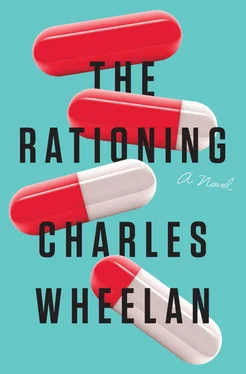“Okay, I’ll take a look,” he replied, obviously puzzled.
“Because nature always fights back,” I added.
“I have no idea what you’re talking about,” he said.
I MET SLOAN AT A STARBUCKS IN BETHESDA. SINCE GRADUATION, we had seen each other infrequently and usually as part of a large group: weddings, reunions, and so on. We had swapped the occasional e-mail, but for all intents and purposes we had fallen out of touch. We never spoke about the night during senior week when we crossed the platonic boundary. Sloan had suggested the Starbucks because it was near her hotel. In hindsight, everything about the meeting was wrong. After I landed at Joint Base Andrews, I had to take a taxi across Washington at rush hour; she walked a block. And why a coffee shop, when we had years to catch up on? I should have at least suggested dinner. I was starving, not having eaten anything since the croissants with Huke. In any case, I had overeagerly accepted Sloan’s invitation, and now here I was accepting all of her terms.
During law school, Sloan had dated a guy a class ahead of her who was the editor of the Harvard Law Review . If the media reports were correct—and I have no reason to believe they were not—she also had a “serious romantic entanglement” with her constitutional law professor in her third year. None of these relationships left Cambridge with her. In New York, she had taken up with a prominent staff writer for The New Yorker , which is highly relevant for all that came next. I took a $65 WeGoNow and arrived at the appointed Starbucks about fifteen minutes early. I lingered near a professional couple sitting opposite one another; both were working their devices frenetically between large sips of coffee. They seemed more likely to get up and leave than the elderly couple a few seats over, whose cups were empty but seemed in no rush to go anywhere. The professional couple soon stood up to leave, and I took their table. (I was right about the elderly couple. They were still sitting there when Sloan and I left.)
Sloan was more or less on time. She spotted me and offered a beaming smile. After waiting in line for a black coffee, she made her way to the table and gave me a big hug. “This is great!” she said. “So how are you?” We did the usual catching up. It was a delightful conversation, diminished only slightly by the fact that Sloan glanced at her watch periodically. I would have stayed there all night, even as I grew ever hungrier. I explained the rudiments of my Ph.D. dissertation and talked about my work in the lab. “But you’re not teaching?” Sloan said. The tone suggested it was a question, but it was more of an observation, and it had layers and layers of significance. This was the first reference either of us had ever made to that starry night during senior week when we had pronounced our life plans.
There was so much implicit in what Sloan had just asked, or said. On that lovely evening, she had predicted that she would go to law school and then enter journalism. And here she was, a Harvard Law grad, checking her watch because she was due back at the New York Times . I had said I wanted to teach at a place like Dartmouth, yet the closest I had been to a classroom on campus since graduation was my meeting with Professor Huke. I knew, even if Sloan did not, that my job talks at various colleges and universities had not gone well. My only offer had been at the University of Nebraska—not even at the main campus in Lincoln, but one of the satellite campuses. My work at the lab was, in the eyes of most academic scientists, significantly less prestigious than a post at a top research university.
“I really like what I’m doing,” I offered, trying hard not to sound defensive.
“That’s great,” she said. The reply felt slightly patronizing, or maybe I just perceived it that way.
“I like applied science,” I explained. “I get to work on real problems, stuff that affects people’s lives.”
Sloan nodded, smiled, and sipped her coffee. “Do people ever move from what you’re doing into teaching posts? Could you still end up at Dartmouth?” she asked.
“I don’t think I’d want to do that,” I answered.
She raised an eyebrow skeptically. “Really?”
“It’s too academic,” I said. I paused, because somewhere in the recesses of my brain there was a safety alert telling me to stop talking. I felt a physical warning from my body, as if I were getting too close to a steep ledge. I kept talking anyway. I felt an overwhelming need for Sloan to appreciate my work, to acknowledge that I had not failed the grand plan that I laid out on that inimitable, sex-charged evening during senior week. “I was with the President yesterday,” I said.
At that point, the dam holding back my urge to say too much had broken.
“Of the United States?” Sloan asked with a quizzical look.
“What other president would it be?” I asked facetiously.
“That’s cool, like a photo op?” she asked.
“The whole day.”
Sloan put down her coffee. She never looked at her watch again. “What were you doing?” she asked.
“I can’t say,” I replied. “I don’t mean to be a jerk about it. All I can tell you is that something is happening and I’m right in the middle of it. I never dreamed that my work would have this kind of significance.” That was all I told her about what was going on. The reality, of course, is that Sloan is smart and ambitious. She could put two and two together, especially with all the resources of The New York Times at her disposal. More important, she was dating a staff writer at The New Yorker , which was where the first piece on “the Outbreak” would run. I was not quoted in that piece, directly or indirectly. When I was asked at the first congressional inquiry whether I had had any contact at any time with any person representing The New Yorker , I answered no—truthfully. To this day, I do not know if the meeting with Sloan was a coincidence or not. The whole journalism community knew that something was afoot at the White House. The cleverer ones realized it was probably something more than a presidential mistress. If Sloan had seen a leaked copy of the White House logs, she would have recognized that I was spending time there. And if I was at the White House, it was probably not to help the President of the United States disentangle himself from a relationship with a Colombian diplomat.
Our strategy throughout the crisis had been to keep each part of our response compartmentalized. Tie Guy knew about Capellaviridae but had no idea about the looming Dormigen shortage (despite his ongoing suspicions that something was up). The senior management at Health and Human Services knew about the Dormigen shortage but had never heard of Capellaviridae . With two sentences I had delivered to Sloan a journalistic gold mine. I was “the guy” on lurking viruses; she knew that. It was the crucial puzzle piece . All the others were in plain view. The warehouse fire in Long Beach was a matter of public record. Presumably some quick research turned up the fact that the fire that had seriously injured Bobo the chimpanzee had also destroyed a large proportion of the government’s Dormigen stock. The Centera arrests were not publicized but they were still public record. Sloan walked out of the Starbucks with a Rosetta stone for the whole story: the connection between Long Beach and Centera and the lurking virus. Since each involved party was unaware of the larger crisis, they all spoke freely when contacted by reporters. When Sloan called Professor Huke the following morning, he talked to her for half an hour about “this thrilling new virus.” And so on.
Читать дальше












